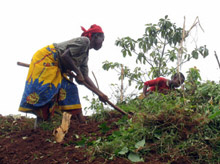
Typical street scene in Santa Ana, El Salvador. (Photo: iStock)
IMF Survey: Burundi's Debt Relief Savings to Go to Food, Health, Schools
February 5, 2009
- Burundi becomes 24
- th
- country to reach final stage of IMF debt relief program
- Authorities complete steps intended to reduce poverty, deliver social services
- Next key priorities are to cut inflation, sustain growth, avoid unsustainable debt
The IMF and World Bank have cancelled more than 90 percent of Burundi's debt, worth about $1.4 billion.

Family tends crops in Kabezi, Burundi: country's debt relief will free up more funds for improving food security (photo: Esdras Ndikumana/AFP)
DEBT RELIEF IN AFRICA
The debt relief means that over the next 10 years, Burundi may save up to $50 million a year to finance additional spending in priority areas such as health, education, agriculture, water, and rural infrastructure.
Burundi is one of the least developed countries in the world. GDP per capita is about $139, and only 18 percent of the population has food security. Burundi is now emerging from more than a decade of civil conflict.
On January 29, Burundi reached the completion point under the enhanced Heavily Indebted Poor Countries Initiative and received additional debt relief under the Multilateral Debt Relief Initiative. The country is now poised to move more rapidly toward improving living conditions and reducing poverty. A key task going forward is to avoid unsustainable debt position by accelerating structural reforms and relying mainly on grants and highly concessional loans.
Faster progress
Debt relief will allow faster progress on reducing poverty in three key sectors of the economy.
• In health, more resources will be devoted to building heath centers in the rural areas and providing free health care to children under 5 and to women at the time of childbirth.
• In education, increased funds will be dedicated to building school, recruiting teachers, and providing teaching materials. These efforts will help lower the student-teacher ratio.
• In agriculture, debt relief means that more funds could be dedicated to improving food security, expanding potable water and other rural infrastructure.
In sum, because of the debt relief, Burundi is now poised to make faster progress toward improving living conditions and reducing poverty. Debt relief thus plays an important role in supporting the authorities' efforts to reach the objectives set out in their Poverty Reduction Strategy.
Reform after relief
In a difficult post-conflict environment, Burundi has made steady though uneven progress. To reach the completion point, Burundi completed several measures aimed at preparing and implementing a national poverty reduction strategy and maintaining a stable macroeconomic environment. The authorities also took steps to ensure efficient and transparent use of debt relief, strengthen public expenditure management, improve governance measures related to social sector services delivery, and expand debt management capacity.
To seize the opportunity of debt relief for faster poverty reduction, Burundi should maintain its reform momentum. Key priorities are to
• Reduce inflation to single digits. Prudent monetary policy should help anchor inflation expectations while allowing sufficient scope for economic growth. Fiscal policy should consolidate progress on strengthening domestic revenue and on reallocating spending to sectors related to the UN's Millennium Development Goals.
• Sustain high economic growth by accelerating structural reforms. In addition to maintaining momentum on fiscal governance reforms, the authorities should continue their efforts to reform the coffee sector and improve the business environment. Burundi's accession to the East African Community should also spur structural reforms that would improve the business environment.
• Avoid unsustainable debt. A two-pronged strategy should help achieve this objective. First, the authorities should accelerate structural reforms to increase and diversify the export base. Second, the authorities should continue to rely mainly on grants and highly concessional loans.
Comments on this article should be sent to imfsurvey@imf.org







